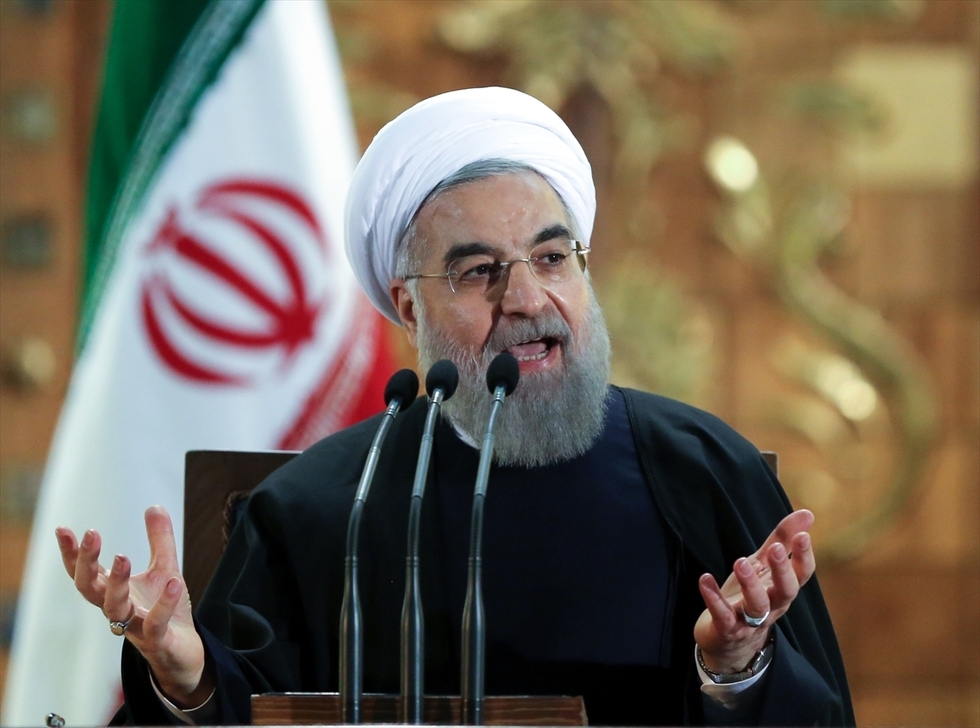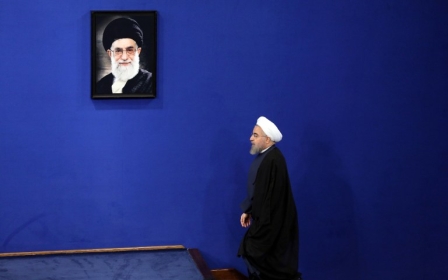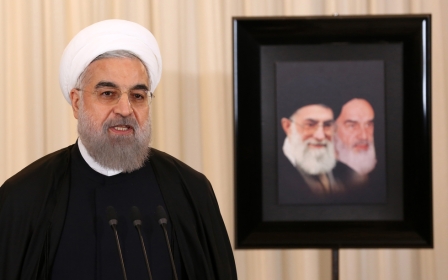Rouhani clashes with Khamenei over Iran elections

As Iranian President Hassan Rouhani celebrates his foreign policy success during his European tour, back at home he has rattled the establishment by appearing to question the integrity of the election qualification process conducted by the Council of Guardians.
Rouhani’s criticism last week of the Guardian Council’s disqualification of more than 7,000 aspiring candidates has been widely interpreted as his first real clash with the power elites of the establishment.
Moreover, Ayatollah Khamenei’s immediate defence of the Council of Guardians was correctly interpreted as a direct snub to Rouhani and characteristic of the Iranian leader’s unwavering intention to support well-established legal procedures in the run-up to elections.
Rouhani and his allies view the elections for the Majlis (parliament) and the Assembly of Experts, scheduled for 26 February, as crucial to their mid-term political fortunes. If the conservatives and their hardline allies maintain, or even increase their domination over parliament, that in turn reduces Rouhani’s chances of winning a second presidential term next year.
The importance of these elections notwithstanding, Rouhani is on shaky legal ground when he challenges the authority of the Council of Guardians. Moreover, even if he really wanted to, Rouhani lacks the political base to confront the establishment.
By appearing to strike a confrontational posture, Rouhani is hoping to cultivate a pro-reform constituency to which he has no valid claim of membership let alone leadership. But this approach, whilst politically expedient in the short-term, is not without major risks in the longer term.
Assaulting the Guardians
Critics of the Iranian political system often point to the qualification process underpinning elections in order to highlight the system’s allegedly innate undemocratic nature. The focus of much of the criticism is the Council of Guardians, the legal body tasked with vetting candidates.
A 12-member council, composed equally of clerics and jurists appointed by the leader and the Majlis, the Council of Guardians is also the ultimate authority on issues related to the constitution and its interpretation. In short, it is effectively the country’s supreme legal authority whose rulings on constitutional matters must be heeded by all three branches of government.
On elections, the specific criticism levelled at the Council of Guardians is centred on its alleged selectiveness in the qualification process which tends to favour conservative candidates or individuals who are fully aligned to the establishment. By the same token, the critics allege that the vetting processes employed by the Guardians unfairly disadvantage pro-reform candidates.
It is important to note that the Council of Guardians also disqualifies conservative candidates, even those with long track records in parliament and other bodies, on the grounds of unsuitability or incompetence. For example, for the upcoming elections the Guardians have disqualified Hamid Rasaei, a well-known hardliner.
On a wider note, many critics simply misunderstand the qualification process. The Council of Guardians does not form an opinion on aspiring candidates on its own. Instead it relies on myriad investigative committees, mostly run by the ministries of interior and intelligence, to collect and analyse information on aspiring candidates.
In fact, the investigative committees work according to strict security protocols that are designed and updated by security circles unaffiliated to the Council of Guardians.
The overriding principle is to protect the integrity of the Islamic Republic’s key decision-making bodies by weeding out infiltrators and other undesirable elements. To achieve this goal the investigative bodies collect exhaustive intelligence on aspiring candidates and carry out forensic background checks.
To accuse the Council of Guardians of political bias requires a cynical disregard of the complex processes employed to manage the vetting process. It also conveniently forgets that both the Ministry of Interior and the Ministry of Intelligence are currently under the firm control of Rouhani allies.
By aligning himself with the critics of the Council of Guardians, Rouhani is occupying shaky legal ground. This is particularly objectionable in view of his legal training, on which he capitalised during the 2013 presidential elections by portraying himself to the electorate as a “lawyer”.
The irony of Rouhani’s position has been highlighted by hardline media outlets which have consistently criticised the president’s assault on the Council of Guardians. The hardliners are particularly incensed that Rouhani has violated legal ethics by criticising the Guardian Council to a foreign audience in his European tour.
Rouhani and the Reformists
The Iranian president’s assault on the Council of Guardians should not be interpreted as a signal of political intent. The fact is Rouhani has neither the will nor the intention to confront the establishment. Rouhani’s apparent objection to the disqualifications is pure gesture politics designed to appeal to a pro-reform constituency.
To fully appreciate the dynamics informing Rouhani’s pre-election posturing requires an understanding of his political predicament. Rouhani and his allies do not have a significant political constituency; instead they are parasitic on pro-reform bodies and opinion formers to reach out to a disaffected reformist constituency.
But this approach has its limitations not least because Rouhani and his allies are completely bereft of reformist credentials. Rouhani’s allies and supporters are by instinct centrist and conservatives who are foremost concerned for their jobs and positions. They will be loath to undertake any action that jeopardises their personal and factional interests.
Nevertheless, by aligning himself too closely to reformists, Rouhani is forced to adopt some of the latter’s narrative and slogans. For example, Rouhani employed the old “competence” versus “loyalty” dichotomy to argue in favour of meritocracy at the expense of revolutionary credentials.
This putative dichotomy, originally identified by the Islamic Republic’s first president Abol-Hassan Banisadr, forms an essential pillar of the reform narrative. Banisadr is a forlorn character in the Republic’s history; he was impeached in June 1981.
The hardliners were quick to point out Banisadr’s fate as a warning shot to Rouhani. Whilst this scenario is unrealistic, nevertheless it highlights the available legal avenues to potentially counter the Rouhani camp’s growing political ambitions.
- Mahan Abedin is an analyst of Iranian politics. He is the director of the research group Dysart Consulting.
The views expressed in this article belong to the author and do not necessarily reflect the editorial policy of Middle East Eye.
Photo: Iranian President HassanRouhani giving a speech during a press conference in Tehran, Iran on 17 January, 2016 (AFP).
New MEE newsletter: Jerusalem Dispatch
Sign up to get the latest insights and analysis on Israel-Palestine, alongside Turkey Unpacked and other MEE newsletters
Middle East Eye delivers independent and unrivalled coverage and analysis of the Middle East, North Africa and beyond. To learn more about republishing this content and the associated fees, please fill out this form. More about MEE can be found here.





